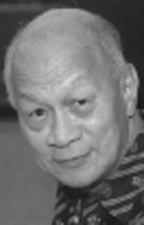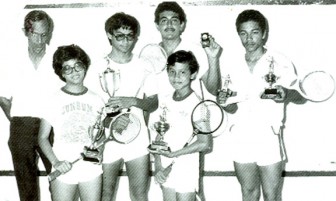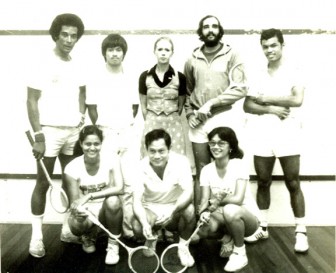Introduction
Bouquets to the Ministry of Culture, Youth and Sports, for providing two public squash courts at Non Pareil Park, Thomas Lands, scheduled to open early this year. Our squash successes in the Caribbean and international field have placed Guyana on the world sports map.
As Dr Ian MacDonald urged in his keynote speech in 2005, at the Sportsman of the Year Award, every sports association ought to keep and maintain an up-to-date record of its history. Carpe diem! This nostalgia buff thus grasps the opportunity to record for posterity the origin of what was called squash racquets in Guyana, and its progress during the first decade.
The sixties

In the early sixties, there was keen rivalry in lawn tennis daily at the GCC Bourda, when expatriate Edgar Readwin would challenge Dr Ian McDonald, our local tennis champion, without success. Frustrated, Readwin seeking in some way to earn a win over McDonald challenged him to a game of squash, but there were no squash courts in the then British Guiana. However, both were senior executives of Bookers, and they were able to initiate the building of the first squash court at the Georgetown Club, Camp Street.
At the grand opening, Readwin at last went one up on McDonald, winning the OK Corral duel 9-0, 9-0, 9-0 before a large gathering. But McDonald, a skilled racquet player, soon mastered the indoor game, and took severe revenge on his challenger shortly thereafter, going on to represent Guyana in squash also for many years.

It is said that squash has its origins in more than one game, the most important of which is called racquets. In its earliest incarnation it was played in France in the 16th century, and much later was first played in England by prisoners serving sentences in London’s Fleet prison for not paying their debts. It was students at Harrow, an English Public School, who popularized the game. They played it with a soft rubber ball that could be squashed, and which made a distinctive sound when hitting the wall, thereby giving rise to the name ‘squash.’
The game develops
Goodwill tournaments between BG and Trinidad began in the early seventies, and the ‘mudlanders’ beat the islanders at the Pelican Inn Court, Port-of-Spain in 1973, ’74 and ’75 with the Guyanese champs – Mike James ’73 and ’74 and Rod Wright ’75, winning the individual male title.
Georgetown Cricket Club built their own squash court at Bourda in the early 1970s and attracted many of the Cosmos Chinese badminton players, when shuttlecocks were temporarily unavailable locally, at the height of the ‘banlon’ years. At the 1976 Goodwill Matches in Trinidad, Barbados and Bermuda joined the fray, with Mike Watkinson, the Guyanese champion, runner-up in the individual match-up. The Guyana contingent included Mike Watkinson, Joe Mekdeci, Mahdu Wellingkar, Bud Lee, Walter Chin, John Phillips and Godfrey Chin.

In March 1977 a Guyana B team comprising Ian Camacho, Malcolm Gordyke , Ron Dummett, Colin Ming, Michael Fung, Godfrey Chin, (Capt) visited St Vincent, and won the Dr Cyrus Trophy.
In 1977, teams from the north and south Caribbean met at the Village Club in Nassau, Bahamas and the Caribbean Squash Racquets Association was formed. Godfrey Chin was appointed 5th Carasra Officer with the mandate assigned to all participating officials to institute junior squash on return to their homeland. It was also decided that the Carasra Championship would be held bi-annually, while each year there would be tournaments in the north and south Caribbean, plus a North v South championship in alternate years.
The Guyana team included Mike Watkinson, Joe Mekdeci, Mahdu Wellingkar, Ian Camacho, Bud Lee, Richard Lee, Godfrey Chin and Josephine Whitehead. On return the junior programme was implemented after school hours, and Saturday mornings at the Georgetown Club with Godfrey Chin, Madhu Welingkar, Dennis Dias and John Phillips comprising the local coaching team.
In 1978 Guyana hosted the first Southern Caribbean Championship, and won the 1981 men’s team event, with individual titles going to our Richard Lee and Josephine Whitehead, which they both retained in 1979 in Barbados and ’80 in Venezuela. Whitehead continued to reign as Southern Caribbean Champion in 1981 in Trinidad, 1982 at home, and 1983 in Barbados.
In 1979 Richard Lee our national champion, was runner-up at the 2nd Carasra Games in Jamaica, losing 2-3 to Orville Haslam in a close final. Sixteen-year-old Gary Chin won the newly instituted under 21 title for the ‘Mudland.’
In April 1981, St Vincent hosted the first Junior Caribbean Championships at which our 12-year-old Richard Chin won the under 14 boys’ title.
By September 1981, at the Third Carasra Championship in Barbados, Guyana was an overall favourite but finished No 2 in the overall team championship. Josephine Whitehead was runner-up in the ladies championship, losing to Perla Manapol of Jamaica, while Indi Wellingkar won the girls’ under 21. Gary Chin retained his under 21 title, and returned home to receive the runner-up Sportsman of the Year Award 1981.
Canadian Ron Hughes came in 1982 to continue our junior squash coaching programme, and took a junior squad on a goodwill tour to Toronto, Canada. John Stewart, another junior coach, came from England the next year. In 1982 at the 2nd Junior Carib Games in Jamaica, Richard Chin retained his under 14 title and between 1981 to 1987, Chin won junior titles annually in each age group to age nineteen.
Our junior programme produced other future junior champions, including Diane Lee, Bruce Lee, Kurt Tai-O-Yong and Garfield Wiltshire, and paved the way for Guyana’s prominence in Caribbean squash thereafter. Seeds planted early grow to be huge oak trees.
By the end of the seventies, the local squash enthusiasts gave continuous support to raise funds for tours, and annual squash marathons were major fund raisers, with champions Ian McDavid and Dennis Dias playing for 24-30 hours non-stop on court. Josephine Whitehead drew up the by-laws of the fledgling association, which was founded in 1981 with Louis Narain as our first President,
By 1982 when Guyana hosted the sixth Southern Caribbean Games, the second court at Georgetown Club was ready. Guyana won the men’s, Ladies’ and overall team events, while Josephine Whitehead retained her title.
I left Guyana that year, and in the next 28 years have been proud to see subsequent junior champions such as Diane Lee, Garfield Wiltshire, Roger Arjoon, Max Weithers, Luke Fraser mature to be senior Caribbean champions and carry the Golden Arrowhead with outstanding success. In 1987, I managed Richard Chin, Roger Arjoon and Garfield Wiltshire in Houston, Texas, to win the US Inter-Club Championship.
Since 1981 our junior squash teams have won at the Caribbean junior games seventeen overall titles. Our boys’ team won the title on 14 occasions (2 consecutively) and the girls, 8 occasions (4 consecutively). Guyana has won the overall Carasra senior championship on three occasions 1989 (Barbados); 1993 (Trinidad); and 1995 (Venezuela). Our men’s team were Caribbean champions on five occasions (’89, ’91, ’93, ’95, and ’99). Our Max Weithers won the Caribbean male championship in ’91, ’93 and ’95 . And of course there is Nicolette Fernandes today creating waves in the ladies world tournaments.
When Richard Chin retiring from representing the USA at World and Panam Games (1992 to 2005) returned in 2010 to Caribbean squash to win the Caribbean men’s title in St Vincent , my squash cup ‘runneth over.’ I must recognize here our present junior coach, Carl Ince, for his outstanding achievements with our juniors.
With the new public court facilities I am confident that our achievements in squash would be surpassed in the not too distant future – we have the talent.





